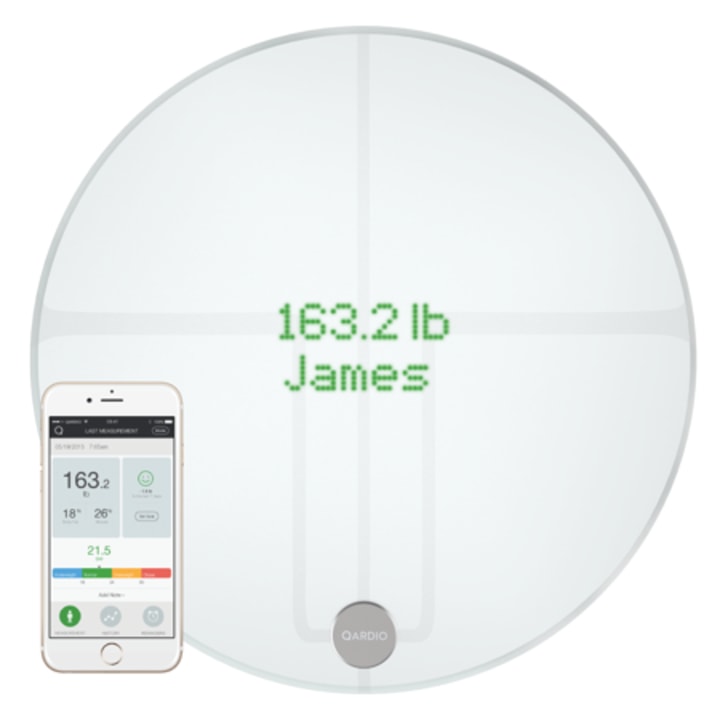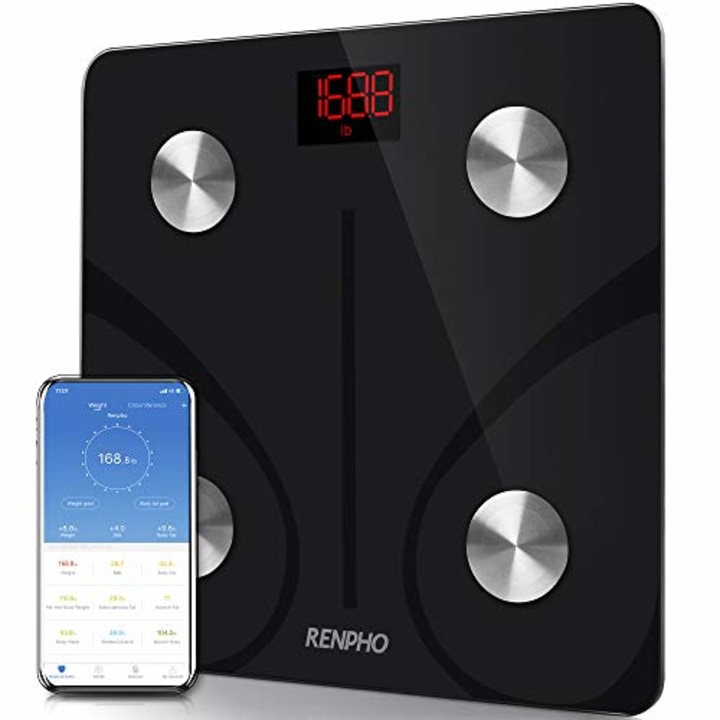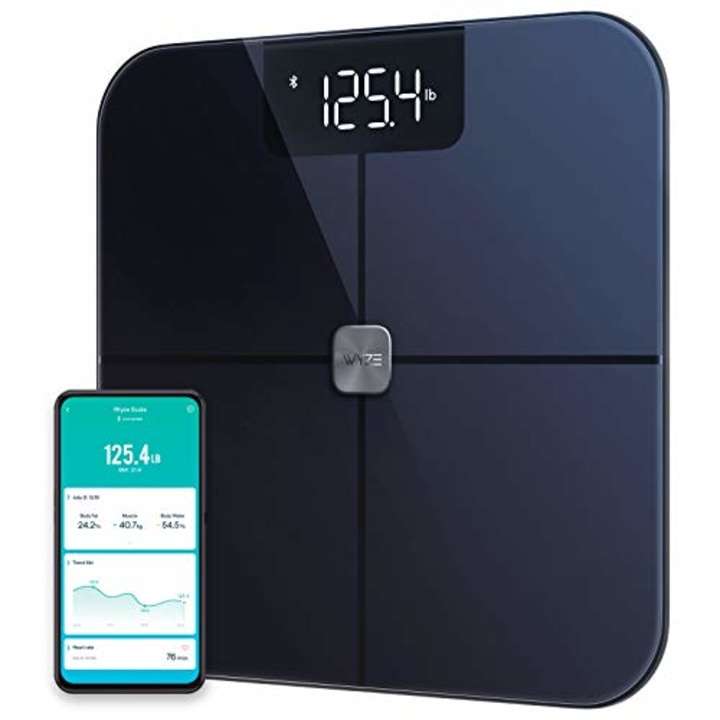How to find the best one for you
If getting healthier is on your 2021 resolution list, you might want to decide how to track your progress. Goals without metrics are just wishes, after all. Weight is one of the most common numbers individuals gravitate toward. It’s an important one, as it can inform health status and risk of developing certain health conditions like diabetes or hypertension. But body weight by no means determines your overall health.
LEARN MORE How to choose the right smart scale
“If you’re only tracking body weight, you are only getting one piece of data about your body,” explained , a spinal and orthopedic surgeon in New York City. “Knowing different numbers can help you to adopt a more effective fitness routine.”
To that end, scales have gotten a bad rap in the past, only showing us our weight, which doesn’t give you the whole picture. Smart scales hope to change that, offering a more holistic picture of your health with different additional metrics. If you’re looking to lose weight or just to gain a better understanding of your health, here’s what you need to know about smart scales: We consulted experts about how they work, what they track and what the best smart scales are.
The best smart scales in 2021
1. FitBit Aria Air Smart Scale
Ideal for users, this smart scale syncs up with your existing data and helps monitor your progress. Scales come in two colors — Black and White — and track weight and BMI, along with the metrics your wearable FitBit offers, like steps and hydration levels. The scale supports multiple users and is powered by three AAA-batteries. While this scale supports other fitness tracking apps, it likely works best with other FitBit products.
2. QardioBase2 Wi-Fi Smart Scale
Unlike most other scales, the QardioBase2 has a round, sleek design. It measures things like BMI, weight and body composition metrics, including muscle, fat, water and bone. Instead of numbers, users can set the scale to show emojis to track progress towards a specific goal. The scale can connect via Bluetooth or Wi-Fi and is compatible with fitness apps like MyFitnessPal, Google Fit, Apple Health and Samsung Health. The scale allows up to eight users and can charge via USB cable, which lasts up to 12 months with one full charge.
3. RENPHO Body Fat Scale
If you want to start tracking your health without splurging, this affordable scale may be your best bet. It connects to all the major fitness apps, including Google Health, Apple Health and Fitbit, and measures 13 different body metrics, including things like skeletal muscle, protein levels and metabolic age. Data sync automatically via Bluetooth or Wi-Fi. Renpho’s scales can support multiple accounts, but keep in mind all .
4. Withings Body+ Smart Body Composition
This highly-rated scale tracks weight, body fat, water retention, bone mass and muscle mass. It can sync with Apple Health, Fitbit and Google Fit — data automatically syncs when your smartphone or wearable connects to Wi-Fi or Bluetooth. Users can even sync their food tracker, like MyFitnessPal, with the scale. The scale offers up to eight user profiles and takes AAA batteries for a typical battery life of 18 months . One key feature of the scale is its display of the daily weather report and previous day’s steps.
5. Wyze Scale Bluetooth Body Fat Scale
This smart technology company, also knownfor their smart bulbs, also makes an affordable scale that offers a variety of body measurements, including fat percentage, heart rate and basal metabolic rate. It syncs with both the Wyze app and other popular fitness apps like Apple Health and Google Fit. It can host up to eight user profiles, and also has “guest mode” for an unlimited number of weightings. Data syncs automatically and can easily connect to your smartphone via Bluetooth. This scale takes four AAA-batteries.
How smart scales work
Smart scales do much more than measure how much you weigh. Using a sensor technology called bioelectrical impedance, smart scales estimate a variety of health metrics, helping you achieve health goals outside of just losing or maintaining your weight, according to Robert Kushner, MD, a professor of medicine at Northwestern School of Medicine. These scales can sync with your smartphone via Wi-Fi or Bluetooth to track your progress over the course of the day, week, month, year and so on. Some smart scales sync with their own apps and some are compatible with both their apps and Google Fit or Apple Health. If you’re looking for a new smart scale, here are some common features you may want to ensure it offers up:
- Body fat percentage
- Water retention, a measure of how hydrated you are
- Basal metabolic rate, which determines energy levels and lets the user know how many calories they need to consume to maintain, lose or gain weight.
- Subcutaneous fat, or the percentage of fat below the skin.
- Metabolic age, or how old your body is, based on basal metabolic rate
- Bone density
Should I buy a smart scale?
The large benefit of smart scales is that they offer more than one measure of health. Scales that offer only one or two measures don’t give your full health picture. For example, BMI is a common gauge of individual health, but it only takes into consideration total body mass relative to height. Someone with a high lean body mass may be classified as overweight by their BMI, despite having low body fat, explained Sarah Hales, an assistant professor with a focus in weight management at the Medical University of South Carolina. That can be “discouraging” to those trying to improve their weight and health, she said.
Understanding the limitations of these measurements is a good first step, as is looking at them holistically. For example, if your BMI is slightly high but you have a healthy fat percentage, that could be a good indicator you’re on the right track, said Hales. Health metrics other than weight and BMI, like bone mass or fluid retention, are likewise important for various health conditions. These are just a few of the features you can get from a smart scale. Tracking multiple health metrics can make some individuals feel more in “control” of their lifestyle and health habits, which may empower them to continue, said Kushner.
Studies show that consistent self-weighing is important for weight loss and weight maintenance, said Hales. Graphing your weight can also help understand weight trends. While a smart scale alone isn’t going to lead to weight loss, if using one makes you more likely to consistently track your weight, it may be beneficial to have one. “I often tell people that taking their weight on a regular basis is like checking your ‘bank account balance’,” Kushner said. “It is important to know where you are and if your ‘balance,’ or weight, is keeping with your health goals.” Of course, a smart scale is simply a device that displays data about your body.
How to shop for a smart scale
First, decide on the feature you want to track — the most popular scale metrics are weight, body fat and BMI. If there’s a more specific feature you’re interested in, like muscle mass or hydration level, you might have to invest slightly more in the scale.
If you already use a smart tracker like FitBit, it makes sense to buy a compatible scale. It will be easier to set up and sync your data, and these scales offer a more holistic health picture when combined with the metrics that your wearable tracks, said Okubadejo.
“Since people use their smartphones constantly, having this data linked gives users more of a 360-overview about their health and may keep them more accountable with information that is stored in one place and easy to analyze,” he explained.
Smart scales can run you anywhere from $30 to $200, depending on the number of features. Hales recommended stepping on and off the scale a few times to make sure its sensors are consistent and the scale itself is durable — you don’t want to feel like you’re falling off the scale each time you use it. Make sure to place your scale on a hard flat surface for accurate measurements. Most smart scales take batteries while others can be plugged into the wall or hold a charge. If you have multiple people in your household using the smart scale, make sure to find a model that supports multiple user options — and that it’s easy to toggle between them. Keep in mind that some scales have weight limits, typically around 400 pounds.
Catch up on the latest from NBC News Shopping guides and recommendations and download the NBC News app for full coverage of the coronavirus outbreak.



